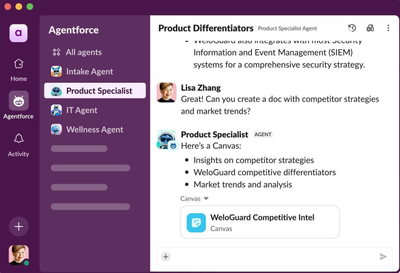
Slack is adding a new way to access AI agents created on parent company Salesforce’s Agentforce platform, with a library of options available in the collaboration app.
Agentforce, which launched in October, is a tool to build AI agents that answer questions and automate tasks for users. Slack has already begun to integrate these Agentforce agents into its app as chatbots available in Slack channels, alongside a range of third-party agents from the likes of Adobe Express, Box, Perplexity and others.
On Tuesday, the company announced that a new Agentforce “hub” is coming to Slack workspaces to help users find the relevant agent to assist with a task. Accessed as a tab on the left-hand sidebar, it provides a list of available and recommended agents that users can browse.
“From there, you can activate your chosen agent and begin a conversation,” the Slack team said in a blog post.
Agents are tailored to a variety of use cases; deal assistance, IT help, onboarding, and marketing strategy are some examples Slack detailed. As well as pre-built agents, customers will be able to host their own customized agents in the Agentforce hub.
Slack also announced the general availability of Slack “actions” that can be added to agent workflows created in the Agentforce Agent Builder tool. This means agents can be prepped to perform tasks such as creating and updating Slack canvas documents, generating Slack lists, and sending direct messages to colleagues.
“Actions” in Agent Builder allow Slack users to customize AI agents.
Slack
Agentforce agents will also be able to search for information across Slack conversations and connected applications, helping the agent chatbots provide more accurate answers.
The three sets of features will be generally available in January to customers with both an Agentforce license and a paid Slack license. Details on the consumption-based pricing model for Agentforce agents in Slack is “coming soon,” a spokesperson said.
AI agents have become a major focus for software vendors in recent months, including Asana, Atlassian, Microsoft, and others. Last week, Google announced a variety of agent-related tools, including a new Agentspace application and a revamped NotebookLM AI assistant for customers of its Workspace app suite.
The “agent” concept is used in different ways by different companies; it generally refers to software systems that can take actions on behalf of a user, with varying degrees of autonomy.
IDC analysts predict that at least 40% of Global 2000 businesses will use AI agents and agentic workflows to automate knowledge work, doubling productivity in the process — at least in cases where the technology is successfully implemented.